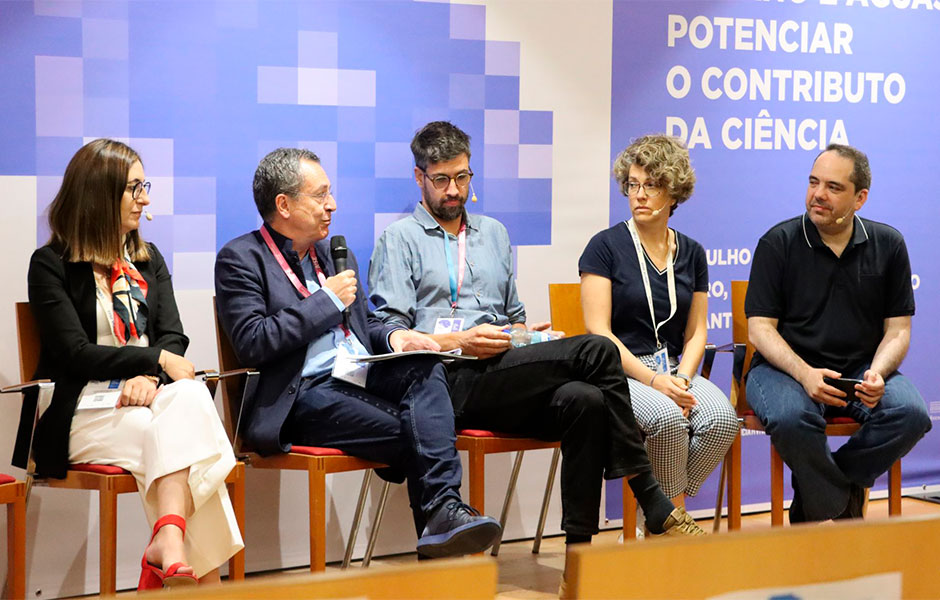A group of researchers from CINTESIS – Center for Health Technology and Services Research participated in a debate organized on July 7 by the Associate Laboratory RISE – Health Research Network, in collaboration with the Associate Laboratory of Translocation and Innovation for Global Health – REAL, on the “Importance of Clinical Research in the context of scientific development”.
Integrated into the program of the Ciência 2023 Meeting, as a thematic session, this debate brought together a group of researchers with experience in the area of clinical research, from different institutions, in addition to having the presence of representatives of the Agency for Clinical Research and Biomedical Innovation (AICIB) among the audience.
The session opened with the intervention of Fernando Schmitt, a researcher at CINTESIS and coordinator of the RISE Associate Laboratory, who highlighted the relevance of these two Associate Laboratories, in particular – RISE and REAL, in the promotion of clinical research in Portugal.
Chronic underfunding
João Pedro Ferreira, a researcher at UNIC@RISE, was the first speaker after the opening session. Recalling an article recently published in Acta Médica Portuguesa, endorsed by several CINTESIS@RISE researchers, the researcher argued that Portugal has a chronic problem of underfunding in clinical research. “The Foundation for Science and Technology (FCT) funds research projects in all areas with a maximum value of 250 thousand euros (…), but there is no call specifically for clinical research”.
João Pedro Ferreira also addressed the difficulties experienced in carrying out investigator-initiated clinical trials, arguing that these trials should receive support, “because they are the only way to generate evidence independently and with rapid application in clinical practice”. “The industry only finances studies that have some interest from the market point of view. And therefore, the only way to conduct independent clinical research would be through public funding,” he said.
To this end, the researcher suggests the adoption of an “integrated funding model, with an annual competition dedicated to clinical research, fostering multicenter projects that promote collaboration between hospitals, health centers and universities”.
Data supports evidence-based decision-making
Luís Azevedo, a researcher at CINTESIS@RISE, was also heard in this session. In an intervention on the role of Data Science in clinical research, the expert pointed out that Data Science in Health “aims to use data to support decision-making and strategic planning in health”. “Data, for us, are merely instrumental. They serve to achieve clinical research objectives, answering fundamental questions of clinical medicine, and supporting decision-making processes at various levels”, from clinical decisions, through decisions in health institutions, to decisions in health policies – “all of which must be supported with the best available scientific evidence”.
However, the expert recalls that Data Science faces some challenges. “Data in healthcare is heterogeneous, large, hard to understand, contextual and can pose huge difficulties”. There are, however, synergies that can be created: “Data Science is looking at using real-world data and generating real-world evidence. There are huge amounts of data being produced every day. One of the goals of Data Science in Health is to develop methods to make the best use of these real-world data, which, being observational and retrospective, complement other types of studies”.
Luís Azevedo concluded by saying that Data Science is “fundamental in fulfilling the mission of clinical research” which, since it is focused on the individual, aims to “provide the best possible health care”.
Promised solutions under discussion
In response to the concerns expressed regarding support and funding, Catarina Resende de Oliveira, president of AICIB, commented that “there is no strategy to allocate the appropriate funds to the research targets so that it can be carried out”. She also informed that the Government, through the Ministries of Economy, Science and Health, is promoting working groups that seek answers to some of the challenges identified, “namely in the area of Data”. She added that there is also “a lack of funding for the Agencies that could play an important role [in promoting clinical research] and that were created for this purpose”.
Fernando Schmitt, moderating the final debate, stressed that there is recognition among researchers that “clinical research has its role, its importance, its peculiarity”. Since there is already an agency created to promote this type of research, there is a need for “funding for the agency, as well as differentiated evaluators in this type of research”.
Luís Azevedo concluded by stating that clinical research can have an important economic impact. “The capacity of clinical research to attract funding is enormous. It could be a relevant business for hospitals and the NHS”. “We can save money and we can make money from clinical research. It is a huge nonsense to keep talking to ourselves about this”, he concluded.
Lúcia Domingues, Inês Fronteira and Marcelo Urbano Ferreira, from Laboratório Associado REAL, also intervened in the session, bringing to the discussion the importance of Clinical Academic Centers, the impact of clinical research on communities and the need for their involvement, and precision health, respectively. Also Carla Bartosh, from CI-IPOP@RISE, presented Pathology as a tool in clinical research during the thematic session.
The Ciência 2023 Meeting took place from July 5 to 7, at the University of Aveiro. It is an initiative of the Portuguese Foundation for Science and Technology (FCT), in collaboration with Ciência Viva – National Agency for Scientific and Technological Culture, with the institutional support of the Government, through the Ministry of Science, Technology and Higher Education and the Education and Science Committee of the Portuguese Parliament.

